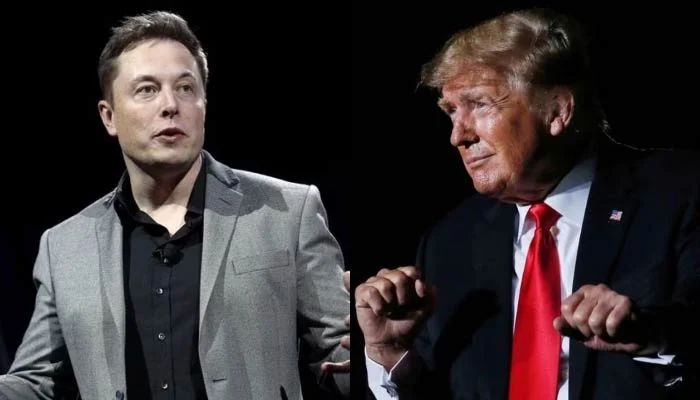Two larger-than-life personalities, Donald Trump and Elon Musk, are poised to dominate public discourse. Can Trump’s political charisma outshine Musk’s tech-driven vision?
BY PC Bureau
As Donald Trump prepares to be inaugurated for his second term as President of the United States on January 22, 2025, an intriguing question looms: will Elon Musk—the tech visionary, entrepreneur, and cultural phenomenon—overshadow Trump’s larger-than-life persona? Both men command unparalleled attention, but their spheres of influence and public personas differ significantly, setting the stage for a fascinating interplay.
<blockquote class=”twitter-tweet”><p lang=”en” dir=”ltr”>NEW: Donald Trump has shown growing signs of frustration with Elon Musk<br><br>Sources close to the transition told Mediaite that Trump is growing weary of Musk’s omnipresence – as well as the media attention his antics are garnering. <a href=”https://t.co/jHxjS1mq4s”>pic.twitter.com/jHxjS1mq4s</a></p>— Republicans against Trump (@RpsAgainstTrump) <a href=”https://twitter.com/RpsAgainstTrump/status/1873790420800725086?ref_src=twsrc%5Etfw”>December 30, 2024</a></blockquote> <script async src=”https://platform.twitter.com/widgets.js” charset=”utf-8″></script>
Contrasting Styles and Domains of Influence
Donald Trump’s dominance in politics stems from his unique ability to galvanize his base with bold rhetoric, unorthodox policies, and an acute sense of media manipulation. His persona is deeply rooted in populism, showmanship, and a keen understanding of the cultural undercurrents that resonate with millions of Americans. Trump’s use of social media—particularly Twitter during his first presidency—was groundbreaking in bypassing traditional media gatekeepers to communicate directly with his supporters. Even after his removal from major platforms in 2021, his brand of unfiltered communication endured through alternative platforms and rallies.
<blockquote class=”twitter-tweet”><p lang=”en” dir=”ltr”>😮 Trump tells Musk to stop fucking around and put away his phone <a href=”https://t.co/xmJYSkcMiH”>pic.twitter.com/xmJYSkcMiH</a></p>— Adam Townsend (@adamscrabble) <a href=”https://twitter.com/adamscrabble/status/1858043465226932510?ref_src=twsrc%5Etfw”>November 17, 2024</a></blockquote> <script async src=”https://platform.twitter.com/widgets.js” charset=”utf-8″></script>
In contrast, Elon Musk’s influence transcends politics, encompassing technology, business, and even pop culture. As the CEO of Tesla and SpaceX, the owner of X (formerly Twitter), and the driving force behind Neuralink and The Boring Company, Musk is a symbol of innovation and futurism. His ability to influence global markets with a single tweet, his advocacy for space exploration, and his ventures into artificial intelligence and social media give him a distinct and far-reaching platform. Musk’s persona is built on unpredictability, intellectual curiosity, and a flair for controversy that often rivals Trump’s.
Musk’s Technological Empire vs. Trump’s Political Machine
While Trump wields power through governance and political theater, Musk’s influence is rooted in technological advancements and economic power. Tesla’s electric vehicles are reshaping the global auto industry, while SpaceX’s breakthroughs in reusable rockets have made space exploration more accessible than ever. Neuralink and his ventures into brain-computer interfaces signal his ambition to transform human capabilities.
<blockquote class=”twitter-tweet”><p lang=”en” dir=”ltr”>😮 Trump tells Musk to stop fucking around and put away his phone <a href=”https://t.co/xmJYSkcMiH”>pic.twitter.com/xmJYSkcMiH</a></p>— Adam Townsend (@adamscrabble) <a href=”https://twitter.com/adamscrabble/status/1858043465226932510?ref_src=twsrc%5Etfw”>November 17, 2024</a></blockquote> <script async src=”https://platform.twitter.com/widgets.js” charset=”utf-8″></script>
Musk’s acquisition of X has also positioned him as a gatekeeper of digital discourse. Under his leadership, the platform has seen significant policy changes, sparking debates about free speech and content moderation. With X playing a crucial role in shaping public opinion, Musk’s control over this digital town square amplifies his already considerable influence.
Trump, on the other hand, is likely to leverage his presidency to solidify his legacy. His second term promises to prioritize policies on immigration, trade, and law and order, as well as a potential overhaul of the federal bureaucracy. However, his political reach—though formidable—is confined by the limits of public office and the checks and balances of the American political system.
Competing Audiences and Narratives
The audiences for Trump and Musk, while overlapping in some respects, have distinct characteristics. Trump’s base is deeply rooted in conservative America, particularly among working-class voters who see him as a champion against elitism and globalism. Musk’s following is more diverse, including tech enthusiasts, environmental advocates, and a global audience inspired by his vision for the future.
This divergence in audiences reflects their contrasting narratives. Trump’s story is one of defiance against the establishment and a promise to “Make America Great Again.” Musk’s narrative is aspirational, focusing on humanity’s potential for progress through technology and innovation. The collision of these narratives may shape the discourse in 2025 and beyond.
The Role of Media and Public Perception
Both Trump and Musk understand the power of media, but their approaches differ. Trump thrives on traditional and alternative media’s coverage of his provocations, which often dominate news cycles. Musk’s media strategy, by contrast, relies heavily on his direct communication with the public via social media platforms, especially X. His tweets can influence markets, spark debates, and even shift cultural trends. Owning X also gives Musk a unique advantage in controlling the narrative surrounding his actions and ideas.
Moreover, Musk’s ventures into artificial intelligence, robotics, and space exploration position him as a figure shaping the future of humanity. This aspirational dimension may give him a broader global appeal compared to Trump’s more divisive persona.
Potential Areas of Convergence and Conflict
Despite their differences, Trump and Musk may find themselves intersecting in areas such as infrastructure development, space policy, and technology regulation. Musk’s SpaceX is a key player in America’s space ambitions, aligning with Trump’s emphasis on restoring American greatness in space exploration. However, Musk’s outspoken criticism of regulatory barriers could put him at odds with the Trump administration’s policies.
Additionally, Musk’s stance on free speech and his management of X could create friction. As Trump’s supporters often use X to amplify their voices, Musk’s content moderation policies will be closely scrutinized. Any perceived bias could lead to conflicts between Musk’s vision for the platform and Trump’s political agenda.
Will Musk Overshadow Trump?
Ultimately, whether Elon Musk overshadows Donald Trump’s persona depends on the metrics of influence. In politics, Trump’s control over policy and his ability to mobilize millions of voters give him a distinct edge. However, Musk’s global impact through technology and his control over digital discourse may position him as a more enduring figure in shaping the 21st century.
As Trump assumes office and Musk continues his ventures, the dynamic between these two towering personalities will likely define much of 2025’s public and cultural discourse. Whether it leads to rivalry, collaboration, or a coexistence of influence remains to be seen, but one thing is certain: both men will command the world’s attention.














